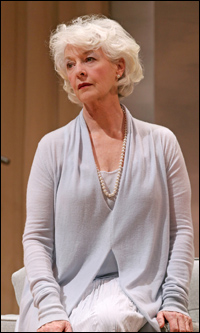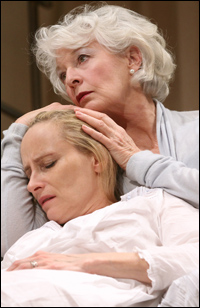
*
During her turbulent four-year tenure as chairman of the National Endowment for the Arts in the '90s, Jane Alexander lived in a Washington, DC, apartment building next door to the then-attorney general of the United States, Janet Reno. Of all things, Reno turned out to be a theatre buff, so when Edward Albee's Pulitzer Prize-winning Three Tall Women played the Kennedy Center, the actress invited the attorney general and her niece, Hunter Reno, to see it with her. Both Renos towered to at least six feet, and Alexander herself came in at 5-feet-10-inhces in heels, so when they went backstage after the play — a phalanx of three making their way down the long red carpet at the back of the theatre — Albee popped up and cheerfully inquired, "Is this my new cast?"
Jane Alexander was never too short for that gesture. Indeed, she has long considered herself an Albee woman, but only now does she have a chance to confirm that when she officially checks in as The Lady From Dubuque in the inaugural production of the End Stage Theatre at the newly-christened Pershing Square Signature Center on West 42nd Strteet, home of Signature Theatre Company.
She arrives — after some raucous, booze-fueled fun 'n' games at the New England home of Sam (Michael Hayden) and Jo (Laila Robins) — at the tail end of Act One, an elegantly attired enigma with an African-American escort (Peter Francis James). Either she is the Angel of Death heralding the imminent departure of Jo, or she is Jo's mother helping with that passage. Why she is beaming so serenely, you must decide.
 |
||
| Alexander in The Lady From Dubuque. |
||
| photo by Joan Marcus |
It was in Washington that Alexander's star started rising as an actress, via a 1967 Arena Stage production of The Great White Hope directed by her now-husband, Edwin Sherin. She and James Earl Jones won Tonys when it transferred to Broadway and Oscar nominations when it turned to film. (It was her debut at both stops.)
Smart and sexy, she makes a perfect foil and has been team-playing on Broadway ever since: in 6 Rms Riv Vu opposite Jerry Orbach, as a dying Joy Davidman to Nigel Hawthorne's Tony-winning C.S. Lewis in Shadowlands, and with Henry Fonda as a fellow Supreme Court justice in First Monday in October.
 |
||
| Alexander and Laila Robins in The Lady From Dubuque. |
||
| Photo by Joan Marcus |
There was no female Supreme Court justice when Jerome Lawrence and Robert E. Lee wrote First Monday in October. "This is how prescient they were: My character was a conservative, from the Southwest, who played tennis and put plants in her chambers," says Alexander. "Plus, I played her in a blonde wig. Guess what? A year later, Reagan appointed Sandra Day O'Connor. Jump to ten years after that: When I was sworn in as NEA chairman, I called up Sandra Day O'Connor — by then we were friends — and said, 'Would you swear me in at the ceremony?' So there was a huge luncheon at the Library of Congress, and Sandra Day O'Connor got up, and before she swore me in, she said, 'Well, you're looking at a perfect imitation of life imitating art.'"
Alexander chronicled her Washington wars in a book called "Command Performance: An Actress in the Theatre of Politics" and then returned to Broadway and her first calling with Honour, earning honor (a Tony nomination) for it.
Since then, except for a run Off-Broadway in Tina Howe's Chasing Manet, her work has been regional. "At Westport, I did David Hare's Breath of Life, and at the Pittsburgh Playhouse and George Street Playhouse, I did Thom Thomas' A Moon To Dance By, which I was thrilled with, about Frieda Lawrence, D.H. Lawrence's widow, and her young lover. We got out-of-town raves, and in the old days of Whitehead and Stevens and Bloomgarden, we would have come in. Now...."
Now, she clears up some long-unfinished business with Edward Albee.











